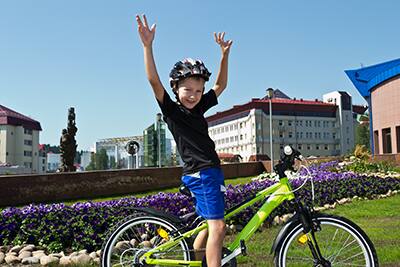
Three Tips for Youth Triathlon Training
by Bob Seebohar
Youth participation in triathlon is continuing to grow each year and with that comes more and more confusion about the principles that should be used to train young athletes. Youth are very keen and eager to learn about the sport through mentors and coaches, but this should be done in a very careful and methodical way. Here are a few tips to use when approaching triathlon training for a young person.
 Tip 1: Youth are not mini adults
Tip 1: Youth are not mini adults
Youth and juniors participating in the sport of triathlon should never be classified as adults when it comes to their training, recovery strategies or their daily nutrition plans. Specific to training, young athletes progress through very different developmental stages at different rates and this must be respected when training opportunities are presented. It is not appropriate for any youth to participate in the same volume of training that adults do. In fact, it is much better to emphasize functional play teaching agility, balance and coordination up until the age of 15. After youth become adolescents, more specific triathlon training concepts can be implemented but at shorter distances.
Most youth triathlon races are comprised of between a 25-200 meter swim, 1-8 mile bike and a 500 yard to 2 mile run. The distance of the races will open up as youth get older but even then, the longest race that is offered to older teenagers is a sprint triathlon distance. It is not recommended for youth to be trained with too much emphasis on volume since their bodies are still growing and injury rate is extremely high during growth spurts.
Tip 2: Form before fitness
By far the most important training concept that should be utilized with young athletes is teaching them proper biomechanics of movement along with teaching them the ABCs: agility, balance and coordination. Each new growth pattern that youth progress through is like them getting a more finely tuned car. Because of this, they must be continually taught the basics of movement pattern learning and mastery before any type of fitness is developed. The great thing is that they will develop cardiopulmonary fitness through more technique and drill work so throwing a ton of volume on their somewhat developmentally delicate bodies will simply not be necessary.
Tip 3: FUNdamentals before specialization
There are two types of training when it comes to youth: multilateral and specialized. All research on young athletes supports that multilateral training (that is teaching proper movements such as skipping, hopping, rolling, multidirectional, etc.) is the necessary step for those age 5-15. Once they reach the age of 15 or 16, they will be ready to specialize in 1-2 sports if they choose to do so. Triathlon is a great sport for young athletes because it is three sports in one which provides more opportunity for movement pattern cross training. However, all youth under the age of 15 or 16 should always be encouraged to participate in other, non-endurance-based sports, to develop different types of agility, balance and coordination.
Once they are ready to specialize a bit during their teenage years, a more methodical approach to training program design can be implemented. But until then, no young athlete should be forced into participating in only one sport opportunity.
It is one of the most rewarding things to see a young person engage in the sport environment. However, parents and coaches should keep in mind that there are more methodical exercise prescriptions and progressions that youth should follow in order to support their growth, maturation and health.
Bob Seebohar, MS, RD, CSSD, CSCS, is a Board Certified Specialist in Sport Dietetics, an exercise physiologist, strength and conditioning specialist and triathlon coach. He was formerly the Director of Sports Nutrition at the University of Florida and recently was a Sport Dietitian for the US Olympic Committee where he traveled to the 2008 Summer Olympics as the Team USA Sport Dietitian. He is the founder of Kids that TRI, a 501c3 non-profit youth organization that inspires kids to be physically active through the sport of triathlon. Find out more about Kids that TRI at www.kidsthattri.org
Contact Bob at coachbob@fuel4mance.com or fuel4mance.com.